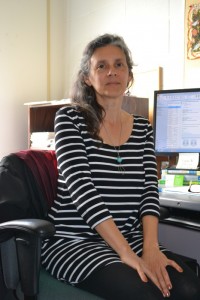When I recognized her crossing the street to meet me, I immediately grew nervous and my brain went chaotic; suddenly everything went quiet, including my usually turbulent head, as she walked into the busy coffee shop. She seemed different that afternoon; out of context she was simply Kari, as opposed to Kari Jones, writer and my professor at Camosun two days a week. However, that transformation made her more intimidating. She was much less of a title, and much more human. She became very real.
Jones has been a writer for as long as she can remember. Although she might say that her 14-year-old journals are hardly considered art, they helped her write her most recent book, So Much for Democracy, which tells the story of a young Canadian girl who moves to Ghana with her family and starts to innocently question the ideas of racism and privilege.
The story is roughly based on Jones’ life as the daughter of a diplomat who found herself travelling and moving quite a bit, until she moved back to Canada seven years later only to realize a whole new kind of culture shock.

“I looked and sounded as a Canadian, but I really wasn’t, and that culture shock was difficult,” remembers Jones.
Jones’ first contact with writing took place in elementary school; she was asked to write a story, and at that moment she realized it was something she enjoyed doing. It translated well to paper: she was rewarded with an A.
“I remember that even though it was more than 30 years ago. It meant a lot to me,” she says, “and I just have been writing ever since.”
The story helped her understand the new world she was living in, she says. “I was living in West Africa and I remember the story was about a woman who had to make a choice; she had one egg and had to choose which child to give it to. There was so much poverty around me and that was something that, as a child, I didn’t really have any way of making sense of, so writing really helped me through that.”
As a young mother, Jones chose to stay home with her son for a few years; during that time she decided to expand her writing abilities. She was writing fiction as well as non-fiction magazine articles.
“It was a way that I could work and be at home at the same time,” she says. “I still needed to contribute to the household income, so I just started writing stories for my son.”
But her involvement with the writing community became more serious when her friends invited her to join a writing group.
“I think that just by being around and spending time with other writers I started thinking I should try to publish my stories,” she says.
Between J.K. Rowling and Margaret Atwood, it’s easy to get carried away by the romanticized idea of what being a writer really means, but Jones makes sure her Camosun students understand that being a writer requires a tough skin and a pile of rejection letters.
“I failed for many years,” she says. “I have a lot of rejection letters at home, and I keep them because I’m proud of them in a perverse kind of way, but I’m also proud to have passed that phase.”
When it comes to reading other authors, Jones says the books she has read have affected her in immeasurable ways.
“I’ve been to so many places in the world through reading, I’ve lived in other people’s shoes through reading, and I’ve understood perspectives that I would never be able to understand through reading,” she says. “A good book can really make you think and can make you question your own morals, your own ethics, and the world around us.”
